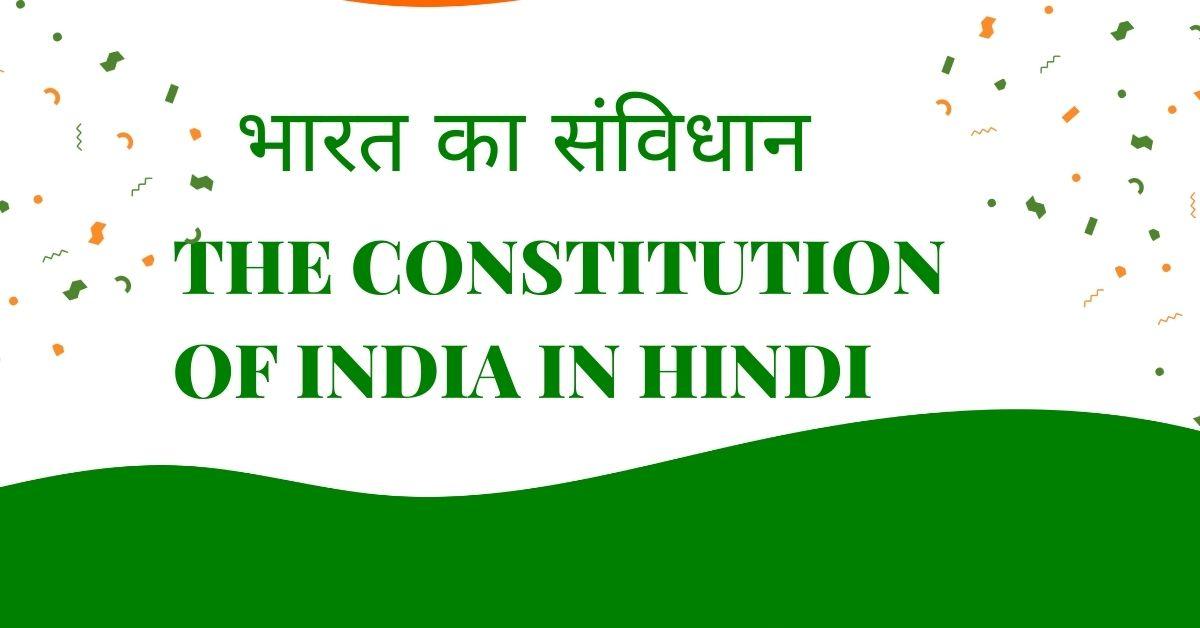The Constitution of India in hindi is the world’s largest written constitution. It came into effect on January 26, 1950, and since then, India is known as a republic. The Constitution defines India’s constitutional status and informs people about their rights and duties.
The written form of the Indian Constitution was prepared by the Nehru Report Committee, chaired by Jawahar Lal Nehru. In addition to this, several leaders and experts played an important role in the preparation of this Constitution.
The initial part of the Constitution provides detailed information on fundamental rights, citizenship, equality, and secularism. Additionally, the Constitution also discusses various topics such as freedom, justice, sensitivity, health, education, representation, and state structure.
The Constitution of India in Hindi – Discription
The Constitution has been amended several times since its inception, and various amendments have been made to it from time to time. Currently, the Indian Constitution has 448 articles in 25 parts, and it has 12 schedules. The Constitution has been divided into different parts, and each part deals with various aspects of governance.
The Constitution of India is unique in many ways. First, it guarantees fundamental rights to all citizens, such as the right to equality, the right to freedom, the right to life and personal liberty, and the right to education. It also ensures that all citizens are equal before the law, regardless of their caste, religion, or gender.
Another significant feature of the Indian Constitution is its emphasis on secularism. India is a diverse country with people following different religions. To ensure that all citizens have the right to practice their religion freely, the Constitution of India provides for the separation of religion and state.
The Constitution also provides for a parliamentary form of government, with a President as the head of state and a Prime Minister as the head of government. The Indian Parliament consists of two houses, the Lok Sabha (the lower house) and the Rajya Sabha (the upper house).
The Constitution also defines the power and responsibilities of various government bodies such as the executive, judiciary, and legislative. It outlines the relationship between the central and state governments and ensures that the powers and responsibilities of each are clearly defined.
The Constitution of India is also unique in the sense that it provides for the protection and promotion of the culture and traditions of different communities in India. It recognizes the importance of diversity and encourages the preservation of cultural heritage.
The Constitution also provides for a system of independent judiciary, which acts as a guardian of the Constitution and ensures that the fundamental rights of citizens are protected. The Supreme Court of India is the highest court in the land, and it has the power of judicial review, which allows it to declare any law passed by the legislature unconstitutional if it violates the fundamental rights of citizens.
Furthermore, the Constitution of India also recognizes the importance of local self-government and provides for the establishment of local bodies such as panchayats and municipalities. These bodies are responsible for the administration of local areas and play an important role in the democratic process.
The Constitution of India also recognizes the importance of education and provides for the establishment of educational institutions. It mandates that the state shall provide free and compulsory education to all children up to the age of 14 years. This provision has played a significant role in promoting literacy and education in India.
The Constitution of India has undergone several amendments since its inception. The first amendment was made in 1951, and since then, several amendments have been made to it to address various issues such as the inclusion of new states, changes in the political system, and the protection of fundamental rights.
The Indian Constitution is considered one of the most comprehensive and detailed constitutions in the world. Its emphasis on democracy, secularism, and social justice has made it an inspiration to many countries around the world.
Download More – The Constitution of India – in English PDF
The Constitution has also played a significant role in shaping India’s political and social landscape. It has helped to promote democracy, social justice, and human rights in India. It has given citizens the power to elect their representatives and hold them accountable for their actions.
In conclusion, the Constitution of India is a remarkable document that has played a crucial role in shaping India’s democratic society. Its emphasis on fundamental rights, secularism, and democracy has made it an inspiration to many countries around the world. The Constitution has helped to promote social justice, equality, and the rule of law in India and has given citizens the power to participate in the democratic process.
